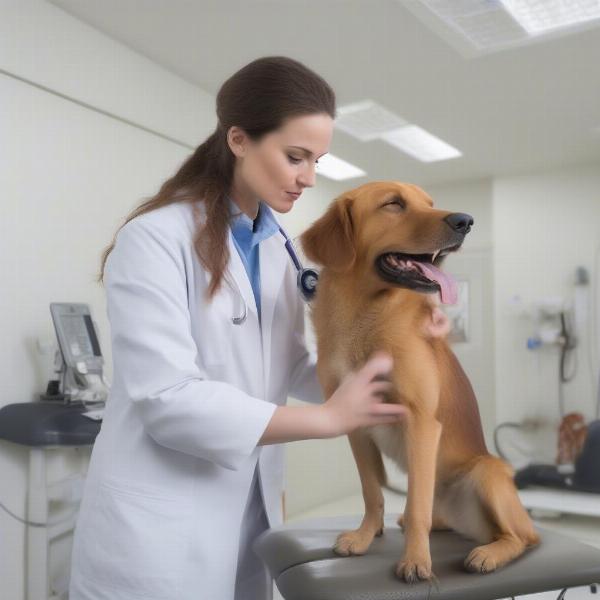Hydrocodone is a powerful opioid pain reliever that is sometimes prescribed for dogs. While it can be effective in managing pain, it’s crucial to be aware of the potential dog hydrocodone side effects. This article will cover the common side effects, serious risks, and important precautions to take when your dog is prescribed this medication.
Understanding Hydrocodone in Dogs
Hydrocodone works by binding to opioid receptors in the brain and spinal cord, reducing pain perception. It’s typically prescribed for moderate to severe pain, such as post-surgical pain or pain associated with injuries. However, it’s essential to use hydrocodone cautiously and only under the guidance of a veterinarian. Misuse or incorrect dosage can lead to serious health issues.
Common Dog Hydrocodone Side Effects
While hydrocodone can be beneficial, it’s important to monitor your dog for potential side effects. Some common side effects include:
- Sedation: Drowsiness and lethargy are common, especially in the initial stages of treatment.
- Constipation: Hydrocodone can slow down the digestive system, leading to constipation.
- Nausea and Vomiting: Some dogs may experience gastrointestinal upset.
- Decreased Respiratory Rate: In some cases, hydrocodone can slow down breathing.
- Loss of Appetite: Your dog might show disinterest in food.
Serious Risks and When to Seek Veterinary Help
While the above side effects are generally mild, some serious reactions can occur. Contact your veterinarian immediately if you notice any of the following:
- Difficulty Breathing: Labored breathing or panting excessively.
- Pale Gums: This can indicate poor circulation.
- Seizures: Uncontrolled muscle contractions.
- Loss of Coordination: Stumbling, difficulty walking.
- Excessive Vomiting or Diarrhea: This can lead to dehydration.
Managing Dog Hydrocodone Side Effects
Your veterinarian can recommend strategies to manage mild side effects. For constipation, increasing fiber intake or administering stool softeners might be helpful. If nausea is a problem, your vet might prescribe anti-nausea medication. Never adjust the dosage or discontinue the medication without consulting your veterinarian.
What if my dog eats hydrocodone accidentally?
If your dog ingests hydrocodone without a prescription, it’s a medical emergency. Contact your veterinarian or an emergency animal hospital immediately.
Important Considerations and Precautions
- Never give human hydrocodone to your dog: Human medications can be toxic to dogs.
- Store hydrocodone securely: Keep it out of reach of children and pets.
- Inform your veterinarian about any other medications your dog is taking: Drug interactions can occur.
- Monitor your dog closely for any changes in behavior or health: Report any concerns to your veterinarian.
 Veterinarian Examining Dog on Hydrocodone
Veterinarian Examining Dog on Hydrocodone
Conclusion
Hydrocodone can be a valuable tool for managing pain in dogs, but it’s essential to be aware of the potential dog hydrocodone side effects. By working closely with your veterinarian, monitoring your dog carefully, and following the prescribed dosage and instructions, you can help ensure your dog’s safety and well-being while using this medication.
FAQs
- Can hydrocodone be addictive for dogs? Yes, like humans, dogs can develop a dependence on hydrocodone with prolonged use.
- What should I do if my dog misses a dose? Contact your veterinarian for instructions. Do not double the next dose.
- Can I give my dog over-the-counter pain medication with hydrocodone? No, consult your veterinarian before giving any other medications.
- How long will my dog need to take hydrocodone? This depends on the underlying condition and your veterinarian’s assessment.
- Are there any alternative pain management options for dogs? Yes, discuss alternative pain relief methods with your veterinarian.
- What are the signs of hydrocodone overdose in dogs? Signs include shallow breathing, pinpoint pupils, seizures, and coma.
- Can hydrocodone be used long-term in dogs? It can, but careful monitoring and management of potential side effects are crucial.
ILM Dog is a leading international dog care website dedicated to providing expert advice and resources for dog owners worldwide. We offer valuable information on dog breeds, health, training, nutrition, grooming, and much more. From puppy care to senior dog care, we cover all aspects of responsible dog ownership. For expert guidance and support in caring for your canine companion, connect with us via email at [email protected] or call us at +44 20-3965-8624. ILM Dog is committed to helping you provide the best possible care for your furry friend.